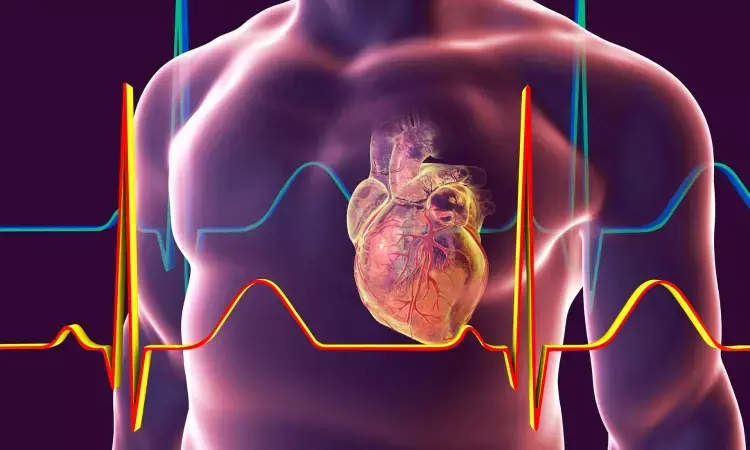- Home
- Medical news & Guidelines
- Anesthesiology
- Cardiology and CTVS
- Critical Care
- Dentistry
- Dermatology
- Diabetes and Endocrinology
- ENT
- Gastroenterology
- Medicine
- Nephrology
- Neurology
- Obstretics-Gynaecology
- Oncology
- Ophthalmology
- Orthopaedics
- Pediatrics-Neonatology
- Psychiatry
- Pulmonology
- Radiology
- Surgery
- Urology
- Laboratory Medicine
- Diet
- Nursing
- Paramedical
- Physiotherapy
- Health news
- Fact Check
- Bone Health Fact Check
- Brain Health Fact Check
- Cancer Related Fact Check
- Child Care Fact Check
- Dental and oral health fact check
- Diabetes and metabolic health fact check
- Diet and Nutrition Fact Check
- Eye and ENT Care Fact Check
- Fitness fact check
- Gut health fact check
- Heart health fact check
- Kidney health fact check
- Medical education fact check
- Men's health fact check
- Respiratory fact check
- Skin and hair care fact check
- Vaccine and Immunization fact check
- Women's health fact check
- AYUSH
- State News
- Andaman and Nicobar Islands
- Andhra Pradesh
- Arunachal Pradesh
- Assam
- Bihar
- Chandigarh
- Chattisgarh
- Dadra and Nagar Haveli
- Daman and Diu
- Delhi
- Goa
- Gujarat
- Haryana
- Himachal Pradesh
- Jammu & Kashmir
- Jharkhand
- Karnataka
- Kerala
- Ladakh
- Lakshadweep
- Madhya Pradesh
- Maharashtra
- Manipur
- Meghalaya
- Mizoram
- Nagaland
- Odisha
- Puducherry
- Punjab
- Rajasthan
- Sikkim
- Tamil Nadu
- Telangana
- Tripura
- Uttar Pradesh
- Uttrakhand
- West Bengal
- Medical Education
- Industry
ECG useful in identifying pulmonary hypertension in patients with severe tricuspid regurgitation

Poland: ECG analysis can predict pulmonary arterial hypertension (PAH) in patients with severe tricuspid regurgitation (TR), according to a new study published in the Journal of Electrocardiology.
Tricuspid valve regurgitation of moderate or high severity affects about 0.55% of the general population. TR can be classified based on the underlying mechanisms as primary, secondary or isolated TR.
Echocardiographic evaluation of TR velocity is a critical measure in pulmonary hypertension screening. Patients are classified into a low, intermediate or high probability of pulmonary hypertension based on its value and additional features of right ventricle overload which transfers decisions of further invasive evaluation. However, in the presence of severe TR, echocardiography underestimates pulmonary artery pressure and therefore pulmonary hypertension may be left unnoticed in some patients.
Marcin Waligóra, John Paul II Hospital in Krakow, Krakow, Poland, and colleagues aimed to assess the role of electrocardiography in predicting the presence of PAH in patients with severe tricuspid regurgitation.
For this purpose, the researchers analyzed 83 consecutive patients with severe TR diagnosed between 2008 and 2021 who underwent right heart catheterization. Of them, 58 had PAH while 25 had isolated TR (iTR).
The study led to the following findings:
- Following ECG criteria supported PAH diagnosis as opposed to the diagnosis of iTR: R: SV1 > 1.0, max RV1 or 2 + max S I or aVL –SV1 > 6 mm, SI/RI > 1 in I.
- For these parameters using ROC analysis we found that the optimal thresholds suggesting the presence of pulmonary hypertension were: R: SV1 > 1.5 (AUC = 0.74, sensitivity 57.1%, specificity of 85%), max RV1 or 2 + max S I or aVL – SV1 > 3 mm (AUC = 0.76, sensitivity 91.4%, specificity of 60%) and for SI: RI > 0.71 (AUC = 0.79, sensitivity 82.5%, specificity of 70.8%).
- The presence of atrial fibrillation predicted iTR with 76% sensitivity and 81% specificity.
"The findings revealed the utility of ECG in identifying pulmonary hypertension in patients with severe TR," the researchers wrote. "The presence of atrial fibrillation facilitates iTR diagnosis, while increased values of R: SV1, R: SI, and increased max RV1 or 2 + max SI or aVL – SV1 favour the diagnosis of tricuspid regurgitation secondary to PAH."
Reference:
Waligóra, M., Smorąg, M., Bukała, N., Zygmunt, M., Kachnic, N., Lis, E., Zaczyńska, K., Wilczek, Ł., Wziątek, B., & Kopeć, G. (2023). ECG patterns to predict pulmonary arterial hypertension in patients with severe tricuspid regurgitation. Journal of Electrocardiology. https://doi.org/10.1016/j.jelectrocard.2023.11.009
Dr Kamal Kant Kohli-MBBS, DTCD- a chest specialist with more than 30 years of practice and a flair for writing clinical articles, Dr Kamal Kant Kohli joined Medical Dialogues as a Chief Editor of Medical News. Besides writing articles, as an editor, he proofreads and verifies all the medical content published on Medical Dialogues including those coming from journals, studies,medical conferences,guidelines etc. Email: drkohli@medicaldialogues.in. Contact no. 011-43720751


